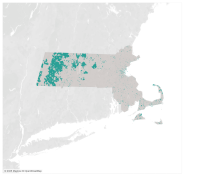
Legal analysts are questioning the recent assertion by the head of the National Telecommunications and Information Administration (NTIA).
NTIA administrator Arielle Roth said last week that the agency she oversees will withhold federal broadband deployment funds from states that have laws enforcing net neutrality or that have enacted affordable broadband legislation similar to New York’s Affordable Broadband Act.
As the assistant secretary overseeing the $42.5 billion Broadband Equity, Access, and Deployment (BEAD) program, Roth’s legal reasoning is striking.
All the more so given that the New York Affordable Broadband Act that requires Internet service providers in the Empire State to offer a low-cost broadband service plan to income-eligible households has been upheld as Constitutional – a case in which the Supreme Court twice declined to intervene and overturn.
Yet, last week in speaking before the conservative Hudson Institute, Roth offered remarks that have legal observers scratching their heads in bewilderment. During her speech, Roth said:
“Consistent with the law, which explicitly prohibits regulating the rates charged for broadband service, NTIA is making clear that states cannot impose rate regulation on the BEAD program. To protect the BEAD investment, we are clarifying that BEAD providers must be protected throughout their service area in a state, while the provider is still within its BEAD period of performance. Specifically, any state receiving BEAD funds must exempt BEAD providers throughout their state footprint from broadband-specific economic regulations, such as price regulation and net neutrality.”
The stakes are high for broadband affordability advocates across the nation.

As we have previously reported, a California Assemblymember who had advanced affordable broadband legislation earlier this year was told back in June by NTIA officials that if her bill passed it would jeopardize the state’s $1.86 billion BEAD allocation. Because of that, she said, the legislation was withdrawn.
Several other states are considering similar legislation. But, in light of Roth’s recent proclamation, state lawmakers and affordability advocates are now left wondering if this latest revelation would, or could, derail affordable broadband legislation under consideration in their respective states – or, if perhaps, Roth is simply using extra-legal means to do the bidding of corporate telecom lobbyists who asked the Trump administration to block state legislative efforts to enact affordability laws.
Experts say it appears Roth has misrepresented her authority.
Withholding BEAD Funds Should Be ‘Laughed Out of the Room’
While the Bipartisan Infrastructure Law that established the BEAD program explicitly calls for BEAD-eligible ISPs to offer at least one “low-cost broadband service option for eligible subscribers,” it also says “nothing in this title may be construed to authorize the Assistant Secretary or the National Telecommunications and Information Administration to regulate the rates charged for broadband service.”

But, the law says nothing about what state lawmakers could do, so it’s not clear why Roth would interpret that to mean state legislation could be preempted by NTIA.
More specifically, her broad interpretation of the language in the infrastructure law runs counter to established case law, as several legal experts who specialize in telecommunications have shared with ILSR.
“In short, I think the current law on this – as established by the 2nd and 9th Circuit – is pretty clear that, absent a source of authority to preempt them, states can regulate and oversee the provision of broadband service within the state, including through net neutrality and affordability laws,” Stephanie Weiner, senior fellow at Georgetown Law School Institute for Technology Law & Policy tells ILSR.
Weiner – who worked as a legal advisor at the FCC from 2013 to 2016 during which time she helped author the Title II order and most recently served as chief counsel at NTIA – added that “while NTIA has considerable discretion to impose certain terms and conditions on the receipt of BEAD funds, it must have legal authority to impose those conditions.”
“I do not see any source of authority that would support NTIA's express or implied preemption of such state laws, particularly for the provision of service outside of BEAD locations.”
Blair Levin, a former FCC Chief of Staff and now New Street Research policy advisor, said the timing of Roth’s new requirement that "NTIA will require states to have providers certify in writing that they will not require or take additional federal subsidies – including operational subsidies – to complete or operate their BEAD projects" was problematic.
He noted that “if, when I was at the FCC, I had suggested changing the rules related to a spectrum auction after the bidding, but before the license award, I would have been laughed out of the room – and I would have deserved far worse.”
Further, while Blair deferred to others on the precise legal analysis, Roth's assertion that the NTIA could preempt states on broadband legislation struck him as odd as,"it is hard to understand putting non-statutory requirements on states after criticizing the Biden administration for putting non-statutory requirements on states.”
Uncertain Path Ahead
Meanwhile, state lawmakers and affordability advocates from California to Massachusetts are trying to figure out how to proceed.

Unfortunately, it appears state legislative efforts will have to contend with less-than-certain outcomes, which for some states may be enough to create a chilling effect.
“It doesn't surprise me that (Roth’s remarks) have created uncertainty because, even if the legal landscape is clear, the amounts of funding at stake and the likelihood of delay that states have already experienced may mean that states don’t feel as though they can litigate their legal claims,” Weiner said.
At this point, it seems the best-case scenario is that a preponderance of legal analyses on the [il]legality of withholding BEAD funds for the reasons Roth stated might convince her to rethink her position. However, given this administration's track record of ignoring laws duly enacted by Congress – such as the termination of the Digital Equity Act or the recent withholding or SNAP benefits – it raises the specter of states, once again, needing to file lawsuits in an attempt to force the administration to follow the law.
Still, in the absence of federal leadership or power, state lawmakers will have to be the ones to step up and make sure that those families that struggle to get online aren't left stuck on the wrong side of the digital divide because of feckless federal policymakers and a broken broadband marketplace.
Header image of gavel on computer desk courtesy of Lawdit Solicitors, CC BY-NC 4.0, Attribution-NonCommercial 4.0 International
Inline image of confusion signpost courtesy of Wonder woman0731 on Flickr, CC BY 2.0, Attribution 2.0 Generic
Inline image of legal dispute resolution courtesy of Pix4Free, CC BY-SA 3.0, Attribution-ShareAlike 3.0 Unported
Inline headshot of NTIA administrator Arielle Roth courtesy of NTIA website







